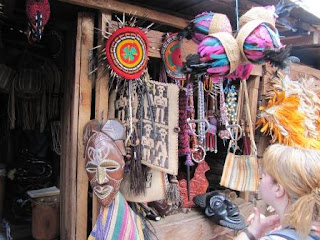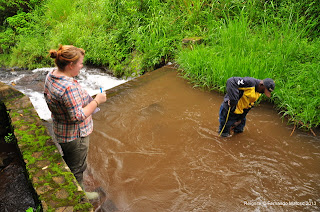So I’ve been here almost a month
so I think it’s time to share some information I have learnt from my time in
Cameroon. What I miss most from England and what I don’t miss at all :P
15 things I have learnt about
Cameroon
1. Oranges are green. It still
throws me off every single time
2. Everyone will tell you “you are
welcome”, and actually mean it
3. There is no such thing a road
safety, or car maintenance. If it has a windscreen with no cracks, tires and
lights it’s a good taxi. Also forget about seatbelts or minimum number of passengers
I Once saw 6 people and 2 kinds in one 5 seat car!)
4. Anything can be carried by a taxi
or bike. I swear on one day I saw a motorbike carrying another motorbike!
5. Food shopping means driving down
a road and then stopping when you see someone selling what you want.
6. Always wash your hands after
handling money, always. All small notes are dirty and they smell odd.
7. Being full/not thirsty isn’t
allowed. If someone offers you food or drink you take it smile and say thank
you, even if you are so full you think death is coming quickly.
8. Horns are used far too much, they
will honk at you if you are walking as if to ask “would you like a taxi” or if
a car is there to say “hey I’m driving here” or sometimes for no good reason at
all. It made me jump every time for the first week.
9. Lights and water aren’t constant;
you just work with what you have. Even if that means having a cold shower in
the dark because the power is out and you can’t boil a kettle.
10. You see the food you eat,
growing, walking around or on trees. Sometimes they are in the same room. For
example when we had cati cati chicken the chicken was chilling in the room till
it was removed and an hour later we had our lunch
11. The weather is unpredictable, you
need sunglasses and an umbrella at all times.
12. When people here your from
England they will start talking about when they went to Germany or Norway, to them
Europe is all the same place…I suppose it’s payback for us saying Africa :P
13. No one has any concept of time,
someone will say good morning to you at 3pm. And if people are less than 1 hour
late it’s not bad.
14. The clothes are amazing, there is
no such thing as dressing for occasion (apart from traditional rituals) people
will wear a full on going out dress during the day. People mix colours like
crazy and the hairstyles use lots of colour too.
15. There is no right side of the road,
there is only the path that avoids the most potholes even if that means driving
on the wrong side of the road with other cars coming towards you.
Top 5
things I miss from England
1. Carpets – I really miss having
carpets so that you don’t have to wear shoes all the time
2.
Cheese and
onion Crisps – you can get pretty much anything here but there are no crisps
3.
Cheese –
there is no cheese anywhere, however we did manage to find dairylea triangles
and it was EPIC
4.
Bacon –
they have pigs but nobody has bacon.
5. Flat roads – the roads here are
bumpy, like riding a bull bumpy.
(Obviously
my friends, family and zac (my dog) are at the top of the list but that’s just
a given)
Top 5
things I don’t miss from England
1. Having to cook- I haven’t cooked
anything here, all my food is prepared for me
2.
Having to
do washing – All my washing is done for me and ironed and folded and placed
outside my door (although that does happen when I’m home)
3.
The
stress – Here there is no rush for anything, you have complete freedom (apart
from actually having to produce a report by the end of three months)
4.
Public
transport – there is no public transport so everywhere you either walk or get a
lift.
5. The British scenery- now don’t
get me wrong there are some beautiful places in England even in Sutton Coldfield
and Birmingham but the scenery around
here is amazing. Every time you go anywhere you see the mountains and hills and
the lushness of the earth. The buildings have great architecture and the people
are so colourful and welcoming.






















































